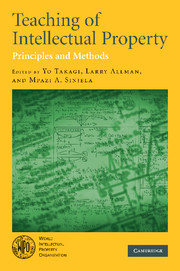Book contents
- Frontmatter
- Contents
- Notes on contributors
- List of abbreviations
- Table of figures
- Foreword
- 1 Recent trends and challenges in teaching intellectual property
- 2 Teaching patents
- 3 Teaching copyright and related rights
- 4 Teaching trademark law
- 5 Teaching industrial design law
- 6 Teaching intellectual property, unfair competition and anti-trust law
- 7 Teaching the economics of intellectual property rights in the global economy
- 8 Teaching intellectual property in a business school
- 9 Teaching IP practical skills for practitioners and attorneys
- 10 Teaching intellectual property to non-law students
- 11 Using the new technologies in teaching intellectual property (distance learning)
- 12 Teaching current trends and future developments in intellectual property
- Index
7 - Teaching the economics of intellectual property rights in the global economy
Published online by Cambridge University Press: 05 June 2012
- Frontmatter
- Contents
- Notes on contributors
- List of abbreviations
- Table of figures
- Foreword
- 1 Recent trends and challenges in teaching intellectual property
- 2 Teaching patents
- 3 Teaching copyright and related rights
- 4 Teaching trademark law
- 5 Teaching industrial design law
- 6 Teaching intellectual property, unfair competition and anti-trust law
- 7 Teaching the economics of intellectual property rights in the global economy
- 8 Teaching intellectual property in a business school
- 9 Teaching IP practical skills for practitioners and attorneys
- 10 Teaching intellectual property to non-law students
- 11 Using the new technologies in teaching intellectual property (distance learning)
- 12 Teaching current trends and future developments in intellectual property
- Index
Summary
Introduction
Analytical and empirical work in economics is paying increasing attention to the vital questions of encouraging innovation and diffusing information in a world where creativity and knowledge lie at the foundation of economic progress. There are numerous complex and fascinating problems for economists to grapple with in the general area of technical change and growth. These range from deep mathematical treatments of the nature of economic growth in the presence of non-rival knowledge goods, to extensive empirical analysis of the role of information acquisition in economic development, international trade, and public economics.
Inevitably, this attention to the growing importance of the knowledge economy places growing emphasis on the determinants of innovation and learning, especially intellectual property rights (IPR). A burgeoning wealth of economics literature seeks to understand the dynamic incentive effects of IPR, the problems they raise for competition, their significance for international technology transactions, and how they fit into broad strategies for economic development.
In this environment, one would expect that economics departments would begin to offer courses dedicated to studying such issues specifically within the context of IPR. Certainly, the formal study of IPR has become central in law schools and management programs in business administration colleges. However, they have yet to take on a significant role in the curriculum of economics departments in the United States, either at the undergraduate or graduate level.
- Type
- Chapter
- Information
- Teaching of Intellectual PropertyPrinciples and Methods, pp. 166 - 184Publisher: Cambridge University PressPrint publication year: 2008
- 1
- Cited by



